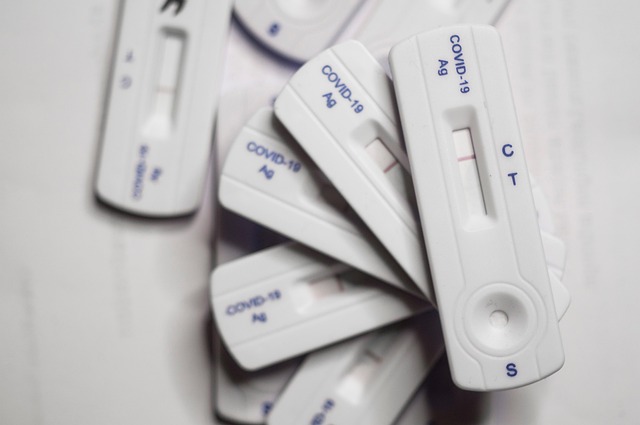Fatigue, weight gain, and dry skin may indicate an underactive thyroid (hypothyroidism). A thyroid health test service checks TSH levels for diagnosis. Holistic approaches, including diet and stress management, can improve thyroid function. Early identification allows for timely intervention with natural strategies to optimize thyroid health.
“Unraveling the mysteries of your body’s hormonal balance, this article delves into the often-overlooked world of an underactive thyroid. Thyroid imbalances can manifest in various symptoms, from fatigue and weight changes to neurological and emotional shifts. We explore common signs that may indicate a problem, shedding light on the disruption of vital hormones. If you suspect an issue, consider a thyroid health test service as the first step towards better well-being. By understanding these indicators, you can take charge of your health.”
- Common Signs of Thyroid Imbalance
- Understanding Hormonal Disruption
- Fatigue and Its Connection to Thyroid
- Uncovering Weight Changes Causes
- Neurological and Emotional Impacts
Common Signs of Thyroid Imbalance

Many people don’t realize they have an underactive thyroid until they start experiencing various symptoms that impact their daily lives. Recognizing these common signs is crucial in understanding your thyroid health and seeking appropriate medical advice. One of the first indicators could be fatigue, feeling constantly tired despite adequate rest, which often leads individuals to believe it’s simply a sign of being busy or stressed.
Another less obvious symptom is weight gain, as an imbalance in thyroid hormones can affect metabolism. A thyroid health test service may reveal elevated TSH (Thyroid Stimulating Hormone) levels, indicating hypothyroidism. Understanding TSH levels in thyroid tests is essential for diagnosis. Additionally, issues like dry skin, hair loss, and sensitivity to cold can be early red flags. Some people also notice decreased energy levels, resulting in a lack of motivation or focus. Given the impact on overall well-being, it’s worth exploring if a healthy diet could improve thyroid function as part of a holistic approach to thyroid health, especially for thyroid health for pregnant women.
Understanding Hormonal Disruption

The thyroid gland plays a pivotal role in regulating our bodies’ metabolic processes. When this small, butterfly-shaped organ at the base of your neck isn’t functioning optimally, it can cause a ripple effect throughout your system due to hormonal disruption. An underactive thyroid, or hypothyroidism, is characterized by an inadequate production of thyroid hormones, leading to various symptoms that may go unnoticed for months or even years.
Understanding thyroid antibodies in tests is crucial when assessing thyroid health. Common causes of thyroid dysfunction include autoimmune disorders, where the body’s immune system attacks its own tissues, and exposure to certain medications or radiation. Hormonal imbalances can also result from lifestyle factors such as stress, poor nutrition, and lack of sleep. Fortunately, there are natural ways to boost thyroid health, including a balanced diet rich in iodine and selenium, regular exercise, and managing stress levels. A thyroid health test service can help identify potential issues early on, allowing for timely intervention and management of hypothyroidism.
Fatigue and Its Connection to Thyroid

One of the most common symptoms of an underactive thyroid is extreme fatigue. Often misattributed to stress or lack of sleep, this persistent exhaustion can be a red flag indicating a deeper issue with thyroid health. The thyroid gland plays a pivotal role in regulating energy production and metabolism within our bodies. When it’s not functioning optimally, this delicate balance can be disrupted, leading to feelings of lethargy and low energy levels.
Understanding TSH levels in thyroid tests is key to diagnosing such imbalances. The thyroid-stimulating hormone (TSH) is a critical indicator of thyroid function. A thyroid health test service may measure TSH levels as part of its evaluation, helping to identify whether the thyroid is producing enough hormones. If fatigue persists alongside other symptoms like weight gain, dry skin, and memory issues, it’s advisable to consult a healthcare professional who can guide you towards therapeutic options for thyroid imbalances, often incorporating both conventional and holistic approaches to manage your thyroid health effectively.
Uncovering Weight Changes Causes

One often overlooked aspect when discussing symptoms of an underactive thyroid is its impact on weight fluctuations. This can be a complex issue as changes in appetite, metabolism, and even stress levels all play a role. If you’ve noticed sudden weight gain or difficulty losing weight despite efforts, it could be worth exploring the possibility of thyroid health issues. A simple thyroid test service can help identify if your body’s metabolic regulator is functioning optimally.
Many people aren’t aware that their thyroid plays a crucial role in maintaining hormone balance, including testosterone levels. Thyroid autoimmunity and testing have become essential components in understanding these connections. If left undiagnosed, an underactive thyroid can lead to a range of symptoms, from fatigue and poor concentration to increased thirst and frequent bowel movements. Don’t overlook these signs; consider a comprehensive thyroid test as the first step towards optimal health.
Neurological and Emotional Impacts

Underactive thyroid, or hypothyroidism, can have profound neurological and emotional impacts on individuals affected by this condition. As the thyroid plays a pivotal role in regulating metabolism, its dysfunction can lead to changes in brain function and mood regulation. Many people experience symptoms such as fatigue, depression, and cognitive difficulties like trouble concentrating or remembering things. These issues often present as subtle changes at first but can significantly impact daily life if left unaddressed.
If you suspect you have any thyroid-related concerns, a thyroid health test service is crucial for accurate diagnosis. Hypothyroidism is sometimes misdiagnosed due to its non-specific symptoms, which can mimic other conditions. Common causes of thyroid dysfunction include autoimmunity, iodine deficiency, and certain medications. Fortunately, proper dietary choices can often support thyroid health. A balanced diet rich in iodine, zinc, and selenium may help improve thyroid function, alongside lifestyle adjustments and medical intervention if needed.
Thyroid imbalances can significantly impact various aspects of your life, from energy levels to emotional well-being. If you’re experiencing any of the symptoms discussed in this article, it’s crucial to consider a comprehensive thyroid health test service as the first step towards regaining balance. By understanding hormonal disruptions and their connection to fatigue, weight changes, and neurological impacts, you can take proactive measures to improve your thyroid health and overall well-being. Remember, early detection and appropriate treatment are key to managing thyroid conditions effectively.
